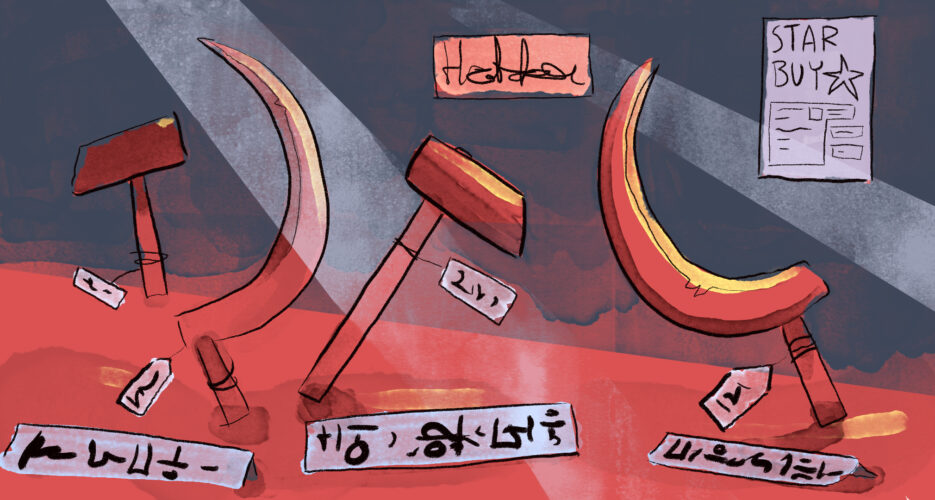Ask a North Korean: How capitalist is North Korea today?
"North Korea has become a capitalist state in a manner that cannot easily be defined with words"
Kim Yoo-sung December 29, 2016

SHARE
NK News/Adam Westerman
Every week, we ask a North Korean your questions, giving you the chance to learn more about the country we know so little about.
Today’s question is: We always read in the media about how much North Korea’s economy has changed in the last decade or so. But how capitalist is the country really?
Officially, North Korea is a socialist country, but when we look closely at it, it is actually a more strongly capitalist country than anywhere else in the world.
Max Weber, who first introduced the term capitalism, defined modern capitalism as a mental attitude that makes a profession out of the systematic and rational pursuit of legal profit. In short, capitalism is defined as the mental attitude of attempting to gain profit through the production of goods, and capitalist economies are defined as distributive economic organizations that produce goods under this attitude.
In other words, capitalism refers to a society in which the process of producing and reproducing the material basis of human life takes place in the form of capitalist production. Accordingly, capitalism can be said to be a unique economic structure of modern industrialization that is established through an industrial revolution.
The capitalist countries that we have seen so far have become capitalist states whilst undergoing the process of modern industrialization, but North Korea has become a capitalist state in a manner that cannot easily be defined with words.
The North Korean government still calls North Korea a socialist country, but ordinary people living in North Korea consider the present society they live in to be a capitalist one. When the DPRK was a socialist state, we lived in a planned economy without any rich or poor people, and with everyone receiving the same amount from the state. This is not the case now.
Even when I was in North Korea, adults would say that North Korea was a socialist country between 1970 and 1990, and that those years were the best in terms of standard of living.
However, as the old Soviet Union began to collapse suddenly in 1990, Kim Il Sung’s lifelong dream of a land of meat and rice on every table and a tiled roof on every house began to die. In the end, North Korea could not become the socialist, communist state it wanted to be, and now its government has turned to capitalism.
As mentioned earlier, between 1970 to 1990 people were so equal that it was difficult to distinguish between those who lived well and those who did not. But as the planned economy collapsed and North Korean society turned to capitalism in the latter half of the 1990s, disparities between rich and poor started to appear.
Normally socialism restricts monopolistic control of industries by particular firms, but from then [the late 1990s] onwards, there were individual trading companies controlling business in each region or at each port.
A typical example from Hamgyeong Province was named Namgang Sales Office. Namgang was like what Samsung is to South Korea: its power was overwhelming.
When goods came into Chongjin Port, all essentials that people wanted such as rice, beverages and fertilizer were monopolized by them and supplied to all regions of the country. As Namgang was connected with the central party, even the provincial governor could not touch them.
Something that would have been unimaginable between the 1970s and 1990s happened: companies like Namgang were growing so quickly and gaining dangerous levels of influence in North Korean society.
Just as when South Korea’s Chun Doo-hwan regime made a power grab by dissolving the Kukje Group company in the 1980s, the North Korean regime, feeling a sense of threat, broke up such companies and sent their leaders and other rich people to jail, on the grounds that they were trading illegally. The boss of Namgang had once received a Labour Hero award from the state, but his company was forcibly broken up and now it is unknown whether he is alive or dead.
In addition, as a marketplace emerges, physical structure forms and appears like the kind found in capitalist countries. In the North Korean market, people who buy and sell goods there are constantly scaling up, producing and reproducing goods.
If the North Korean government forcibly dismantled the market, the North Korean economy and people’s lives would deteriorate. Knowing this reality, North Korea cannot get rid of the market. The market can be said to be the center of the North Korean economy.
Until now, North Korea has not been able to solve all its problems with money, but it has become a society where if you have money, you won’t have any problems. If you have a lot of money, you can become a government official. As long as your social status [songbun] is not bad, you can buy your way up to any position.
That’s how strong the power of money is. In a socialist state, everyone is equal, but in North Korea now it is money that determines a person’s status. In a capitalist country, you can have a housekeeper or cleaning lady but in North Korea, you can have a servant or a butler if you have money.
Therefore, when I look at North Korea – including the whole of the North Korean government – it is like an old feudal society, but when I exclude the government, North Korea is a more strongly capitalist nation than anywhere else in the world. I think that North Korea should be seen as being the most distinctly capitalist nation in the world.
Written by Yoo-sung Kim
Translation by Daniel Tudor

Kim Yoo-sung
Kim Yoo-sung is an Ask a North Korean contributor who left Gil-joo County of Hamkyungbuk-do, DPRK in 2005
No comments:
Post a Comment